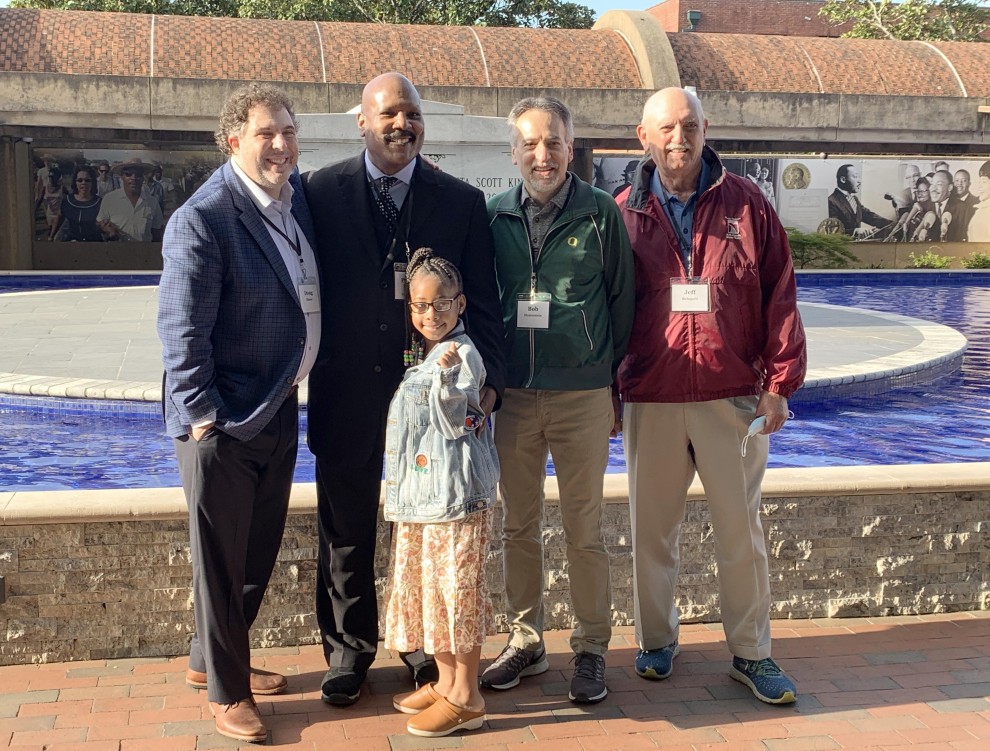
PHOTO: Trip participants (from left) Doug Blauer, Pastor J. W. Matthew Hennessee, Ashtynn Yarborough (the pastor's granddaughter), Bob Horenstein and Jeff Reingold in front of an elongated reflecting pool from which rises the tombs of Rev. Martin Luther King, Jr. and Coretta Scott King in the King National Memorial Park. On the steps of the pool is but one of the reverend's famous quotes: "We will not be satisfied until justice rolls down like water and righteousness like a mighty stream."
BY BOB HORENSTEIN
I had been on a civil rights trip to Atlanta, Montgomery, Selma and Birmingham three years ago, so why go on, let alone organize, the same journey last month? For starters, since nearly half of my fellow travelers were from the local African-American community, I wanted to experience the history of the civil rights struggle through the eyes of those who have experienced discrimination and whose ancestors had been the victims of systemic racism and oppression in this country.
Yet, there was another compelling reason to repeat this sort of educational experience along with the desire to bond with the amazing participants. When I look back on my so-called high school education, specifically my one and only U.S. history course, I feel cheated. Cheated because what I was taught at that time glossed over important – and uncomfortable – parts of American history, downplaying the ugly legacy of slavery and Jim Crow laws. Cheated because I wasn’t taught that the country I love was built on white supremacy.
I attended Woodrow Wilson High School in Southwest Portland. The same Woodrow Wilson who screened the reprehensibly racist film, “The Birth of a Nation,” in the White House in March 1915. Of course, we never learned that our school was named after a president who openly admired the Ku Klux Klan. (Wilson was renamed after the Black civil rights advocate and journalist Ida B. Wells in 2021.)
In the late ‘70s at Wilson, were we taught that two million kidnapped Africans – two million – died, their corpses thrown overboard into the Atlantic Ocean, as the slave ships made their way to our shores? Or that by 1730, half the population of New York City owned slaves, a higher percentage than any other colonial city except Charleston, S.C.? That it was slaves who cut and cleared the road that would become Manhattan’s Broadway and built the wall for which Wall Street was named?
Were we taught that Andrew Jackson, a slave owner and our seventh president whose face adorns our 20-dollar bills, once placed an ad in the Tennessee Gazette offering a reward for the capture of an escaped slave and “ten dollars extra, for every hundred lashes any person will give him, to the amount of three hundred?”
This is exactly why trips such as the one organized by the Jewish Community Relations Council and Vancouver Avenue First Baptist Church in April are so important, especially given the current climate in this country. Lawmakers in several statehouses – Mississippi, Arkansas, Texas, Iowa South Dakota and Missouri among them – have proposed and in some cases even adopted legislation to prohibit lesson plans in our public schools that focus on the centrality of slavery to American history.
How are these efforts to erase the dark stains on American history any different from attempts to minimize the Holocaust?
Our civil rights trip, in particular the visit to Brian Stevenson’s powerful Equal Justice Initiative Lynching Memorial and Legacy Museum in Montgomery, was for me a poignant reminder of the straight line from slavery to Jim Crow to race-based gentrification and mass incarceration. We learned who we were and, frankly, who we are even now. We still have a long road to travel in this country, but now we have newly inspired and well-informed partners with whom to face present and future challenges.
Bob Horenstein is the Director of Community Relations and Public Affairs for the Jewish Federation of Greater Portland.

0Comments
Add Comment